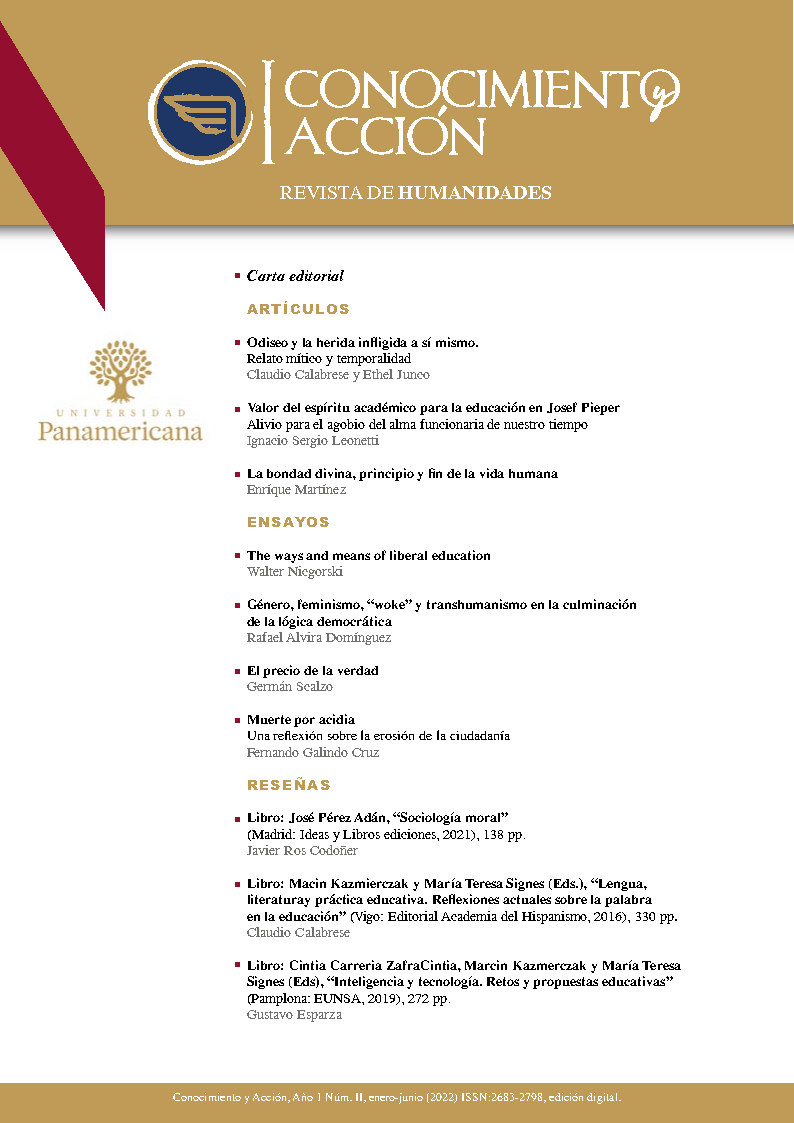Published 2022-01-08
How to Cite
Copyright (c) 2022 Conocimiento y Acción

This work is licensed under a Creative Commons Attribution-NonCommercial-ShareAlike 4.0 International License.
Downloads
Abstract
One of the basic thesis of Saint Thomas Aquinas’s metaphysical thought is that divine Goodness is the beginning and the end of all things created and of human life. This Paper explains that idea in the light of the following principle: good is self-diffusive through the actuality of the esse; and this happens in such a way, that the more an entity participates in the esse the more it communicates its own perfection. Thus, the article will describe the different degrees of the perfection of the universe, before we reach out to God, who as a subsistent Esse is maximally communicative of His own Goodness. Therefore, Creation can be explained as the beginning and the end of all things created, which tend to imitate the divine Goodness seeking its own perfection; which occurs mainly in the rational creature, who does it through knowledge and love. Finally, we will move from a metaphysical reflection to a theological one, thus referring to the highest communication of divine Goodness that occurs in the Incarnation of the Word; all of which is ordered to the supernatural attainment of that kind of Goodness within the beatific vision. The entire explanation is complemented with texts from Dante’s Divine Comedy, whose metaphysical and theological perspective is the same as the Aquinate’s one.
References
- Agustín de Hipona, Confessiones, PL 32, Migne, París, 1844-1864.
- ― De Trinitate, PL 42, Migne, París, 1844-1864.
- Báñez, Domingo, Scholastica Comentaria in Primam Partem Summæ Theologiæ S. Thomæ Aquinatis. Madrid-Valencia: FEDA, 1934.
- Canals, Franciso. Sobre la esencia del conocimiento. Barcelona: PPU, 1987.
- Canals, Francisco. Tomás de Aquino, un pensamiento siempre actual y renovador. Barcelona: Scire, 2004.
- Concilio Vaticano II, Gaudium et spes, AAS 58, 1966.
- Juan de la Cruz , <>, en Obras completas. Madrid: Editorial de Espiritualidad, 1980.
- Millán-Puelles, Antonio. La formación de la personalidad humana. 7ª ed., Madrid: Rialp, 1989.
- Tomás de Aquino, De Potentia Dei. Turín – Roma: Marietti, 1965.
- ― De Veritate. Roma: Editori di San Tommaso, 1970-1976.
- ― Scriptum super Sententiis. Parma: Pietro Fiaccadori, 1856-1858.
- ― Sermo Puer Iesus. Roma – París : Commissio Leonina - Les Éditions du Cerf, 2014.
- ― Summa contra gentiles. Turín – Roma: Marietti, 1961.
- ― Summa Theologiae. Roma: S.C. De Propaganda Fide, 1888-1906.
- ― Super II ad Corinthios. Turín – Roma: Marietti, 1953.
- ― Super De divinis nominibus. Turín – Roma: Marietti, 1950.
- ― Super Epistolam ad Hebraeos, Turín – Roma, Marietti, 1953.
- ― Super Ioannem, Turín - Roma, Marietti, 1972.


